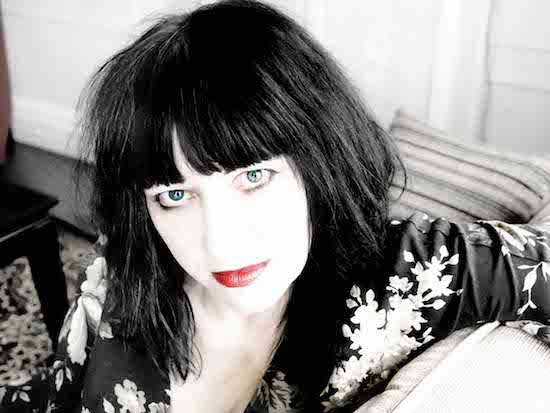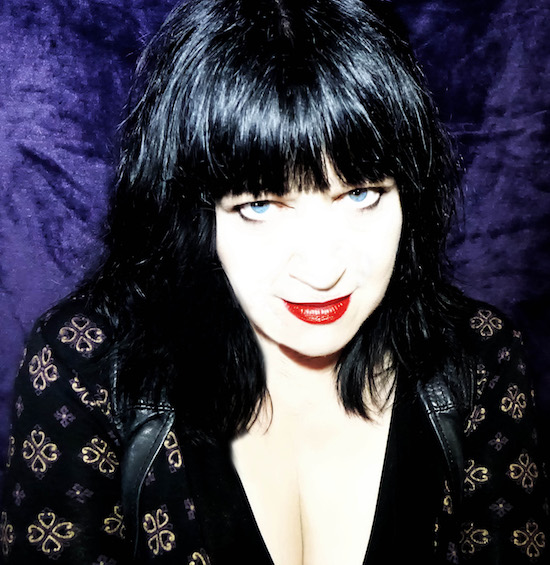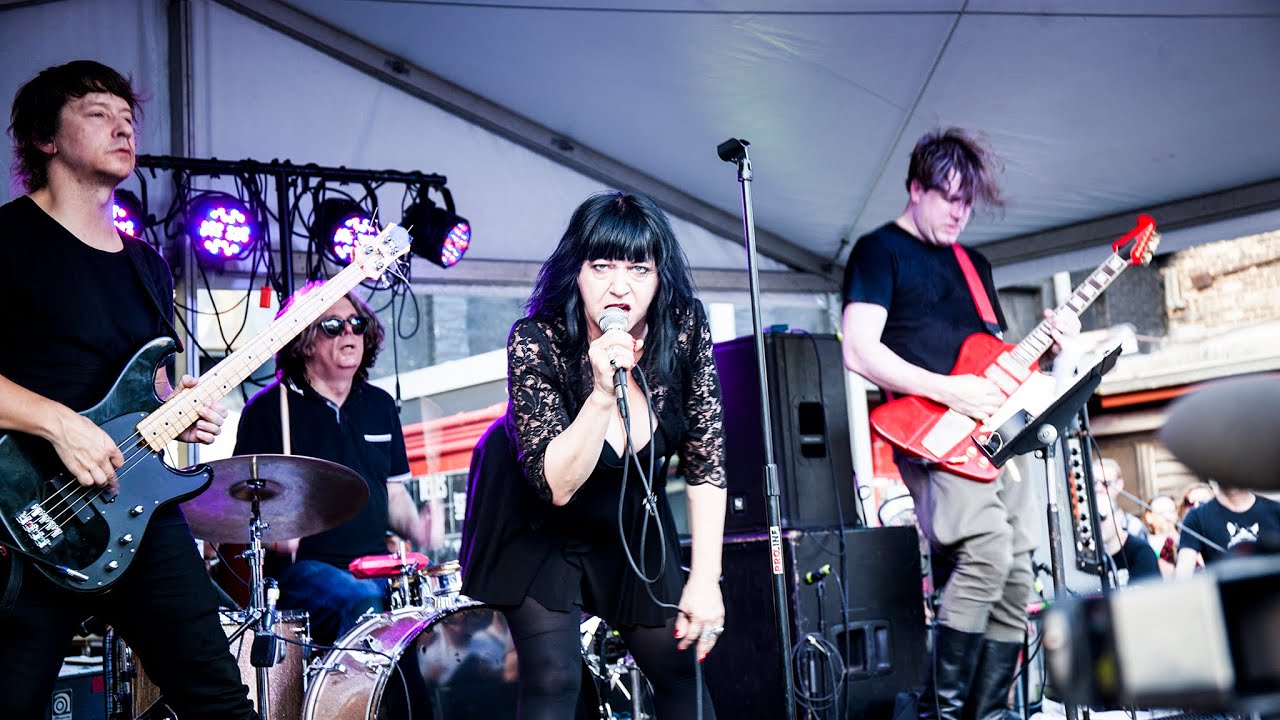Portraits by Jasmine Hirst
Provocateur. noun.
1: one who provokes.
a political provocateur.
2: a person who deliberately behaves controversially in order to provoke argument or other strong reactions.
agitator, demagogue, exciter, firebrand, instigator, rabble-rouser.
The term provocateur is one thrown around too damn easily, but when it comes to uncompromising counter culture iconoclast Lydia Lunch, it fits like a leather glove. Nicknamed ‘Lunch’ by singer Willy DeVille because of her reputation for stealing food to feed The Dead Boys as a young loud and snotty 14-year-old runaway – her kleptomaniacal skills were enshrined in the song I Need Lunch by Stiv Bators. ("I said I don’t need no cook, girl/I need lunch/Baby I don’t need romance/I just want to get in your pants/FEED ME.")
For 40 years Lunch’s brutal candor on the fringe and underground art scenes in forms ranging from spoken word to semi-hardcore porn has been a form of purgatorial public therapy. As she says in the introduction to her 2009 book Will Work For Drugs, “I wish they made enough good drugs to reward the blood and brain matter I have splattered over these pages, countless stages, celluloid, vinyl…”
She has collaborated on everything from music to photography with such underground luminaries as Hubert Selby Jr, Richard Kern and Roland S Howard. Primarily a writer, Lunch first combined her poetry with music in the short-lived but influential No Wave band Teenage Jesus And The Jerks from 1976 – 1979, with James Sclavunos, later of Nick Cave And The Bad Seeds, on drums. Sclavunos, a virgin at the time, says that “being deflowered by Lydia” was a prerequisite for joining the band.
In her book Girl In A Band, Kim Gordon, another past collaborator, wrote, “punk rock felt tongue-in-cheek, in air quotes screaming ‘We’re playing at destroying corporate rock.’ No Wave music was… ‘No we’re really destroying rock’…” While Lydia herself is quoted as saying, “To play slide guitar I’d use a knife, a beer bottle… glass gave the best sound. To this day I don’t know a single chord on the guitar.”
Her blunt, exhibitionistic reclamation of victimhood can be heard at its most harrowing on the 1984 monologue Daddy Dearest. Never one to shy away from taboo, there, for 12 long minutes, Lunch recounts in graphic detail the complex emotions of her chronic sexual abuse by her father: “From lyin’ in bed and wantin’ so badly exactly what it was that I shouldn’t want, and knowin’ too that you wanted it worse.” Lunch’s outright refusal to be subservient to victimhood is the nexus running through much of her work, as is the idea of redirecting trauma by turning it into hedonistic excesses and deviant sexual expression.
On top of that, Lydia Lunch: The War Is Never Over, a career-spanning documentary retrospective by long-term friend and collaborator Beth B, has been released. Having worked together since the late 70s – Lydia appeared in her films Black Box and Vortex – Beth was the natural choice to offer up this portrait. The companion book of the same name, which is published by Jawbone Press and includes contributions from Thurston Moore, Jim Sclavunos, Kid Congo Powers, Bob Bert, and Richard Kern, is out at the end of April. As author Nick Soulsby writes, "Before #MeToo, before Riot Grrl, there was Lydia Lunch."

Where are you speaking from?
Lydia Lunch: Brooklyn. I just got off a flight from the West Coast of Australia. Fortunately just in time before all this madness shut the world down.
What’s your take on it?
LL: Overreaction. Either they know more than what they’re telling us or they’re dumber than we thought. I mean, “flu” kills a lot of people. Last year 36,000 people died of the normal flu. It’s hard to say.
The situation just keeps escalating hour by hour.
LL: Yeah. It seems so.
[Skype cuts out. I ring back.]
LL: Don’t tell me the Skype has the virus now.
You once said, “Everything I do is a memoir, my whole body of work is self-documenting.” Why then was it time to make a documentary?
LL: Well that was exactly my question when Beth B approached me. And it’s a very good question because I’m not dead yet. But first of all, it was time to do a documentary because everything I’ve been saying seems more pertinent now than ever. I’ve been talking about everything from climate change to the abuse of power – both sexual and political – for 40 years. Another reason is that I’ve worked with so many different people that it is to showcase and highlight them as well. I think that a lot of people might have heard one of my records or seen one of my spoken word shows and assume they know what I do. But what I do is forever transforming. And I wouldn’t have done it with anybody except for Beth B, who I’ve worked with since the late 70s, so it was time at least for volume one.
Well, she photographed your vagina.
LL: Well, err, she’s done more than that. I’ll leave that to your imagination. Not everyone gets to photograph my pussy, that’s for sure.
Is that book in print?
LL: Uh, the book that goes with the documentary? Or the book of vaginas?
The book of vaginas.
LL: You’ll have to ask Beth that. I think it came out as a very limited run. It wasn’t only my vagina honey: it was a whole book of vaginas. They’re all unique. I couldn’t even find mine. She had to point it out to me, even though I’ve looked at it plenty in the past. It’s pretty cute. Most of them are [LAUGHS]. We need to see more of them.
A few years back you revived Teenage Jesus, performing with Thurston Moore. Do you have any desire to perform that stuff again?
LL: Well if somebody could afford to hire us we might do it. I did one more revival of that with Weasel Walter and Tim Dahl, just one show. Weasel had put together the ultimate Teenage Jesus live LP that came out on Nicolas Jaar’s label Other People a couple of years ago. It’s fun because it does make me hateful because it’s hateful music. I like playing it. Women! Don’t worry about being ugly, play some ugly music. It’s not a pretty thing. But I think it’s been accurately documented. I would rather organise a tour of my Queen Of Siam album because I’ve only done that once. But with Retrovirus we’re covering so many decades of my work that I don’t think of it as a revival. I think of it as a retrospective because most people have never heard these songs anyway, live or anywhere else. It’s fun. Who knows. The human jukebox just keeps on playing honey. I don’t take requests but we just keep playing.
Do you still despise the term performance artist?
LL: Well I do because… urgh… I really don’t like the term spoken word artist because it’s so generic. The illustrated word is the term I use when doing multimedia spoken performance. I feel like a documentarian. I feel like a journalist. What I do takes different forms.
You’re quoted as saying, “I will battle until the day I die”, and “I’m just pleased to have shat in the face of history”.
LL: Well that’s a good one, isn’t it?
The title of the documentary, The War Is Never Over, would seem to run parallel to this. You’re still angry.
LL: I’m angry at the right things. I’m never angry in my private life. I’m just not going to give over to that force. During daylight hours I focus on wherever that anger needs to go. Outside of us, mostly, because the machine is bigger than all of us. This isn’t new, these times. We’ve been through pandemics, we’ve been through poverty, we’ve been through insanity, historically, over and over again. One of my early speeches went, “Same as it ever was, same as it ever was…” I’ve been saying the war is never over for decades and what I mean by that is, first of all, the war against every form of oppression, and depression, the war against our own existential angst. The war against whatever we were born unto which we did not place upon ourselves. And this is why we’re living longer, because we have more battles to fight. Within and without. But it’s gotta end with some kinda fun. Some kinda love, as The Velvet Underground would say. Some kinda love, yeah! Get it where you can.
Your whole career you have turned your personal trauma into art. If your father had never abused you as a child do you imagine your life would have taken a different trajectory?
LL: I really think the fact the race riots happened right outside my front door when I was eight years old had a great impact on me as well, and that’s what led to me doing a lot of political spoken word work. In the era that I came up in, even as a young child, there were so many things that we naturally rebelled against. So without all of that I’m sure I still would have been rebellious, and I’m sure I still would have talked about the imbalance of power regardless. The reason that I have the power to speak about my situation is because I wasn’t the only one going through it. I was somebody that was drawn first to literature before music and I didn’t find a lot of women’s issues or obsessions or depressions or traumas described accurately, if at all. I felt there was a void in literature and spoken word that I needed to fill. And I would have felt the need to fill it no matter what.
Especially given when you were growing up, women’s voices tended not to be heard.
LL: Oh, exactly. People always say ‘oh, it was such a bold move’ for me, but really it was a natural move. I think what differentiated me was I never had any shame over what had happened. People suffer guilt over religious persecution, physical trauma, emotional abuse… But I never felt that way. Because I knew exactly who the fucking perpetrators were. And it went all the way up the line to that fraudulent asshole wearing a white gown that sits in supposed heaven that doesn’t exist. I saw the trajectory of the abuse of women and even other men from a very early age. And people of colour too, because I was witness to riots right in front of my house, so I think I would have had to have done what I do no matter what.

Would you say that all performance comes from a place of trauma?
LL: Well of course it doesn’t, otherwise there wouldn’t be such horrible pop music littering up the airwaves. With rich idiots that have done nothing but put words into their mouths. That other people have written.
But what about that classic line about all actors not receiving enough love as children? The same could be said for mainstream pop stars, surely?
LL: Well either that or they received so much love and money that they just want more. I can only talk about my own coven and brood. Certainly personal trauma and political trauma is a basis for a lot of great art because if you feel so polluted or you feel your blood is burning then something has to come out. But it’s preferable to get it out with art than violence. I think that a lot of the violence stems from abuse. Some people figure out a way to take it to the stage and others are just filled with rage. I’m filled with rage and I take it to the stage. Which means that in most of my spare time I’m not filled with rage, because although my anger is immense, it’s immense on the political scale. It’s never levelled against people I know. It’s never on a street level, let’s put it that way. And I think just because I’ve had so many vehicles and mediums to express this anger that really I rebel with pleasure. So fuck you.
Yeah.
LL: And I endorse that all of us do that even if we’re in quarantine. If we’re quarantined, then bring your non-infected friends over and let’s get back to how we used to have fun. Or better yet, think of new ideas and ways to masturbate. Come on! Let’s all go! I mean, let’s all come… Let my people come. I think we all need to get back to ourselves and do what our latest lover might not be able to achieve. We might have to become very onanistic. Why not.
You preach that pleasure is the only real rebellion.
LL: I’m an e-van-ginical, honey. I preach it all the time.
And you’ve written a lot about being both insatiable and unsatisfied sexually. But I always thought that part of being traumatised was being unable to find any real pleasure in anything.
LL: Well that’s why you’ve gotta turn it around because that’s something that’s imposed on you by outside forces. So you have to fight to win back your pleasure. That’s what my book Paradoxia is about: segregating yourself from your trauma. It’s about getting to become your own lover and getting back to a place, pre-trauma. Because a lot of people who have been traumatized do become gluttons or drug addicts or alcoholics because there is a hole that they can’t fill. There was something that died inside us when we were children, so we have to find a way to get back to that moment before the trauma… and that’s not an easy thing to do. However, I think I’ve succeeded…for the most part. [LAUGHS]. It’s not that it ever leaves you because it lives in the body like a greedy parasite that wants to come out whenever it can, but you have to tame that beast. First I said, let the beast run wild! Then understand the beast. Then you better put it on a chain in the backyard and let it come out in the right way. And I feel like having a little masturbation just talking to you, honey! [LAUGHS] Verbal for now. Verbal. I’m glad you’re chuckling Kate. I’m glad you’re laughing, because it’s all we can do now. We have to laugh.
You’ve always said your mission was to document certain periods of time. Are you content with your body of work? How often do you sit and look back at all you’ve done?
LL: Well that’s a very good question because I’m thinking of a few of my friends that are more prolific than I am, specifically JG Thirlwell and Weasel Walter. They have this forever unsatisfied compulsion to document their lives. They’re a little younger than me so they have more to do. It’s very important to review what you have done to understand what you’ve accomplished and it doesn’t matter if it’s one book or two hundred records. As a writer or any kind of artist you have to sit back at some point and appreciate what you’ve done in order to be able to know what the next step is. I don’t wake up every day and go, ‘I’ve gotta create something’. I create only when it’s mandatory, only when the situation demands that I do. So when the situation has changed, when there’s a subject I have to cover, or when I have a musical concept that needs to be expressed, I’ll go and find the collaborators. But I tend to live my life as an artist and I try to encourage other people to do the same. Now that I’m doing my podcast The Lydian Spin every Friday, I get to interview all these incredible people who have been stubbornly creative for decades in all forms of art, music, literature and science, and put that out as a platform. A counterculture does exist, that’s why The Quietus exists, because there are still strongholds. The podcast is a different way of being creative without having to have yet another physical document. I mean, I’m very happy that everything I’ve ever done is available on Bandcamp or YouTube. That it’s out there. I’m very happy that NYU bought my archives and will eventually have a digital museum so people can just search for ‘1990 music’, to see what was I doing. I’m not gonna stop being creative but I’m forever looking for new ways to do it. I love to collaborate and the podcast is a great way of doing that. I do it with Tim Dahl who is in Retrovirus with me. This afternoon we’re going to record a pandemic special playing songs like ‘Don’t Fear The Reaper’ and just having a discussion about it. I think a lot of people are stuck inside so why the hell not listen to the pandemic podcast!
If the world’s still spinning by Friday, that is.
LL: Eh! Don’t worry the world’s gonna outlast us all, it’ll be here. I know there’s nobody out there but maybe a little further into the atmosphere we’ll find intelligent signs of life. Unlike what rules most of this planet.
Talking about outlasting, how does it feel to have outlasted so many of your peers, and to have been elevated to this icon status?
LL: Well, ok, that term doesn’t come out of my mouth! Icon status. A lot of my peers are still doing things. But people only have so many ideas and they’re not stubborn enough, or they don’t wanna face the imminent poverty that being an artist entails. I was nomadic for four years of my life in my 50s. Who wants to do that? It was partly out of choice, partly out of rent strike stubbornness and partly out of not wanting to choose where to live. But time is one long second, it’s not forever. I don’t know how it feels to be my age, I simply don’t act it. And I don’t look it, so I don’t know. Just keep on truckin’. And keep on fuckin’ while you’re at it. And if ya can’t find somebody you wanna fuck, go back to what I said before, fuck yourself. And I say that in great abandon.
There’s this story that Nick Cave is quoted as telling…he says in the 80s you shoved an orange segment in his mouth, tampons up his nose, tied his hands together, pulled your knickers down, sat on his face and farted. While Henry Rollins watched – laughing.
LL: I mean, that’s ridiculous. I mean, gimme a break. First of all, I would’ve stuck the tampons in his mouth. Why? How about this story, I stopped him from OD-ing three times. I told him, “You do it one more time and you’re dead motherfucker, okay?” That sounds a bit more realistic, doesn’t it? I mean, he likes to fabricate, yknow. He’s a fictionalist.
When are you back in the U.K.?
LL: I don’t know! When are they lifting the travel ban?!
Lydia Lunch can be heard weekly on her podcast The Lydian Spin, co-hosted with Tim Dahl every Friday.
Lydia Lunch: The War Is Never Over by Nick Soulsby is out April 30 via Jawbone Press




